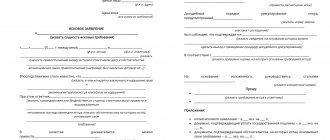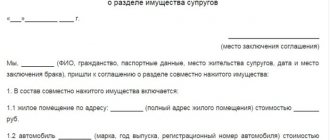Under what circumstances is it necessary to recognize ownership through the court?
The peculiarity of the legislation on shared participation is that only the developer has the opportunity to register ownership of an apartment to a specific citizen. Typically, the share participation agreement provides for the developer’s obligation to formalize ownership of the apartment after transfer under the acceptance certificate and completion of construction. In some cases, a separate agreement is concluded for a fee with another organization. However, in practice, if there is a delay in the transfer of an apartment, or a dispute arises regarding the collection of a penalty, the developer avoids fulfilling his obligation or simply does not fulfill it, citing the complexity of the procedure. The lack of registered ownership rights deprives the buyer of the opportunity to dispose of the property. In this case, the buyer is forced to independently go to court with a statement of claim for recognition of ownership rights.
In some cases, a dispute over the recognition of ownership rights arises when concluding exchange agreements when exchanging real estate, or when demolishing old houses. The procedure in this case is similar.
Housing in a new building
Recognition of ownership of an apartment in a new building through the court is an equally common practice associated with problems arising with state registration of real estate. With shared participation in construction, you can buy an apartment very profitably, since housing in an unfinished building costs much less than after it is put into operation. However, it happens that construction companies begin construction before receiving permission and do not talk about it
to your customers. Of course, after the construction work is completed, the building permit will not appear. This is due not only to the irresponsibility of the developer, but also to the fact that the house may lack any utilities or there may be problems with their supply. Until all discrepancies are eliminated, permission to put the house into operation will not be issued and no one will be able to register property rights.
At the same time, it also happens that the apartment has been received, the residents have moved in, but registration of the apartment is impossible due to the fault of the developer. The situation can only be resolved through the court by filing a claim. It is difficult to cope with such a difficult task on your own, so it is advisable to immediately seek help from an experienced lawyer who will help you competently draw up a claim and prepare all the documents required for it.
Difficulties arise if the construction company conducted unfair sales and sold the same apartment to two or even three persons at once. In this case, the person who bought the property first will receive the rights to housing. The rest will have to sue the developer to return their money.
What documents are needed to file a claim in court?
Once it becomes clear that the developer or administration (prefecture, city property department) is evading the obligation to register your property rights, the following documents must be submitted to the court: – statement of claim; – state duty (300 rubles); – share participation agreement or exchange agreement; – documents confirming payment for the equity participation agreement without debt; – act of acceptance and transfer of the apartment (if available);
Some courts, when considering a dispute, request the following documents: – construction permit; – land allotment documents (lease agreement); – documents from the BTI; – extract from the Unified State Register for the apartment; – act of commissioning and assignment of a postal address;
Recognition of ownership of an apartment: features of the procedure
Recognition of ownership of an apartment occurs if a private person has property grounds. Ownership of an apartment is acquired after purchase, as a result of donation, inheritance, by decision of the court and local authorities.
What are property rights to an apartment?
Recognition of ownership of an apartment is a document that confirms the legal right of an individual to own a certain property. Ownership rights also assign a number of responsibilities to the owner: he becomes responsible for everything that happens to the object and is obliged to pay the established fees for it.
Recognition of ownership of an apartment is most often secured through contracts:
- sales and purchases of an object on the primary or secondary market;
- exchange;
- donations;
- inheritance.
If real estate is owned by a will, then it is necessary to secure the fact of transfer of ownership rights by an inheritance agreement. Property rights come into full force after passing the mandatory state registration procedure, during which a new owner is assigned to the object. After registration, the object officially belongs to the specified person, and he is responsible for it.
Data on all ownership rights to real estate are stored in Rosreestr. New owners are registered there. An agreement on property rights must necessarily contain detailed technical characteristics of the object, and also be based on a document confirming the transfer of ownership rights.
Recognition of ownership of an apartment: features of the procedure
Depending on the nuances of the situation, the stages of recognition of ownership of an apartment may include not only the conclusion of the necessary contracts, but also the elimination of extraneous claims to the object.
In court you can defend your property rights, as well as deny claims to third parties.
Recognition of ownership of an apartment through the court can occur with the participation of:
- legal entities and individuals - cases are considered by city and district courts;
- state bodies and individuals - disputes are considered by the arbitration court.
The defendant may be the developer company, applicants for housing space, or local authorities in disputes about privatization. Before starting the proceedings and filing a claim, be sure to visit a lawyer and assess the prospects of defending your interests. An experienced lawyer will immediately identify the existing risks and tell you whether you should count on winning.
Documents for recognition of ownership of an apartment
Documents for recognition of ownership of an apartment for the court include a claim and all papers confirming the rights to the object. To claim property rights you need:
- court name and address;
- information about the plaintiff;
- information about the defendant with details, if it is a developer company;
- a detailed description of the reason for going to court, the basis for property rights, an indication of violations on the part of the defendant;
- cost of the claim with an expert assessment attached;
- attachments, signature and date.
To recognize ownership of an apartment, additional data may be required:
- passport and copy;
- registration certificate of the apartment or house that is the subject of the dispute;
- act of acceptance and transfer;
- documents confirming the rights of the plaintiff (donation, inheritance, purchase or sale);
- checks, receipts related to the case;
- witness's testimonies;
- check for payment of state duty.
The success of recognition of property rights through the court depends on the experience of the lawyer, the claims of the parties and the legal grounds for these claims. Any dispute or conflict regarding the property must be resolved immediately. This will increase your chances of winning.
It is better not to take any action on your own. Especially if we are talking about a serious opponent in the person of the authorities and a large developer. Each action must be agreed upon with a lawyer.
For all questions regarding the recognition of property rights through the court, you can seek advice from. Our lawyers will provide professional assistance in solving cases of varying levels of complexity and will tell you how to act in a specific situation.
Filing a claim
A statement of claim for registration of property rights is filed in accordance with the rule of exclusive jurisdiction - at the location of the property that needs to be registered. The choice of jurisdiction depends on the value of the property and, accordingly, on the cost of the claim. When the indicated value is less than 50,000 rubles, the case is under the jurisdiction of a magistrate, if more - a district or city court of general jurisdiction. In practice, the second is much more common; only garages and other small buildings are valued at less than 50,000 rubles.
What issues are resolved in parallel with the recognition of property rights?
In the process of asserting ownership of residential space, including in a new building, the plaintiff may be faced with some related issues. Their solution will be much more effective if you contact the services of a specialized lawyer in housing and civil procedural disputes. For example, helping to recognize the ownership of an apartment to their clients, lawyers of the Moscow Municipal Bar Association also offer the opportunity to:
- 1. Refund of money that the applicant transferred to the developer or other party for registration of ownership. The demand for return is put forward together with the demand for confirmation of ownership through the court. In most cases, the shareholder or buyer of an apartment under development contributes money to ensure the apartment has ownership status at the time of signing the relevant agreement. At the same time, the cost of registration can be more than hundreds of thousands of rubles. If the developer or investor has not fulfilled his obligations regarding the registration of the apartment, the funds are most often not returned to the client. In such conditions, you can demand the return of this money in court, both in parallel and after completion of the procedure for recognition of the right to own, use and dispose of the apartment).
- 2. Compensation for penalties due to delay in transferring apartments to full ownership. As a rule, the issue is resolved in parallel with the recognition of rights to property. The standard agreement provides for an indication of the exact timing of the commissioning of a new building and the transfer of residential space to equity holders or buyers. Thus, if this condition is violated, an experienced lawyer will help collect a penalty.
- 3. Compensation for moral damage and forced expenses for legal assistance. Despite the fact that payment of the state fee and related expenses are borne by the plaintiff, the court allows the latter to demand compensation for these expenses from the developer who violated the obligations of the contract. When going to court, the lawyer will clarify your position regarding receiving compensation and, if necessary, file an appropriate petition.
You can clarify details about solving related issues by phone or in a personal consultation with a lawyer from our team.
Evasion of state registration of transfer of ownership
Colleagues, good afternoon!
The situation is this: a notarized agreement for the purchase and sale of an apartment has been concluded, according to the terms of the agreement, we pay the money after registering the transfer of ownership to the buyer, and the acceptance certificate is also after registering the transfer of rights.
Our seller is avoiding registration; a claim was recently sent to him demanding that he appear at the address, but of course he did not show up. The repeated claim was also sent by telegram, the seller did not show up.
According to paragraph 2 of Art. 165 of the Civil Code of the Russian Federation, if a transaction requiring state registration is completed in the proper form, but one of the parties avoids registering it, the court, at the request of the other party, has the right to make a decision to register the transaction. In this case, the transaction is registered in accordance with the court decision.
From the explanations contained in paragraph 61 of the joint Resolution of the Plenum of the Supreme Court of the Russian Federation No. 10 and the Plenum of the Supreme Arbitration Court of the Russian Federation No. 22 of April 29, 2010 “On some issues arising in judicial practice when resolving disputes related to the protection of property rights and other real rights” it follows that if one of the parties to a contract for the purchase and sale of real estate evades taking steps to state registration of the transfer of ownership of this property, the other party has the right to appeal to this party with a claim for state registration of the transfer of ownership. The buyer's claim for state registration of the transfer of rights is subject to satisfaction, subject to the fulfillment of the seller's obligation to transfer the property.
Thus, if a transaction requiring state registration is completed in the proper form, but one of the parties avoids registering it, the court has the right, at the request of the other party, to make a decision to register the transaction. In this case, the transaction is registered in accordance with the court decision. The meaning of this legal norm is to suppress the dishonest behavior of a party that evades the mandatory registration of a transaction while observing and fulfilling all the terms of the contract by both parties. In this case, the transaction from which the defendant side is evading must comply with the law.
Question:
1. Could there be a problem that we have not yet paid for the apartment and have not accepted it according to the acceptance certificate (according to the terms of the contract, payment and acceptance of the apartment after registration of the contract)?
According to the PP “…. The buyer’s claim for state registration of the transfer of rights is subject to satisfaction subject to the fulfillment of the seller’s obligation to transfer the property,” but we have not accepted it?
It is clear that in the claim I will indicate “…..and transfer the apartment according to the deed to the Buyer.”
2. What requirements must be presented to the Seller?
What confuses me is this, how the requirements for the Seller should be formulated....
My options:
1). Carry out state registration of transfer of ownership of rights
2). Submit documents for state registration of transfer of ownership.
3). Oblige the defendant to carry out state registration of the Agreement between the plaintiff and the defendant
4). Make a decision on state registration of the transfer of ownership....
The first and third options are confusing because only Rosreestr carries out registration).
I'm more inclined towards the latter!
I will be glad to any opinion and criticism.
Required data
The statement of claim for state registration of property rights must contain the following elements:
- formal requirements to indicate the court, details of the parties, etc.
- confirmation of the claims of the plaintiff owner - for example, a purchase and sale agreement, or a deed of gift. The features of these documents, the time of conclusion, the date the plaintiff took possession, etc.
- circumstances according to which the plaintiff did not receive state registration of property
- legal justification for the requirements - most often indicated in Article 551 of the Civil Code, which prescribes the possibility of carrying out such a procedure in court
- operative part - requirement for state registration
A sample claim is also available on the website.










